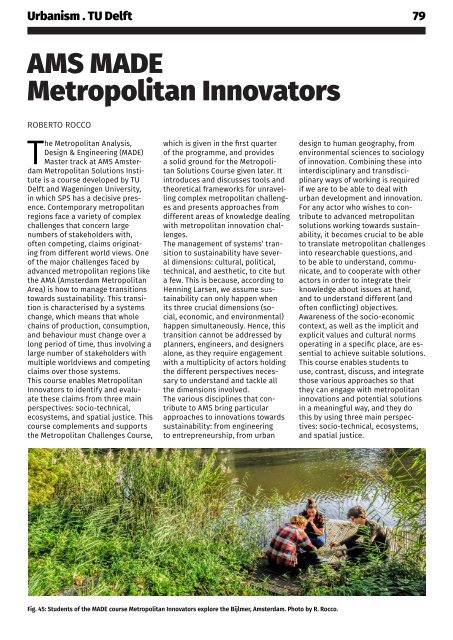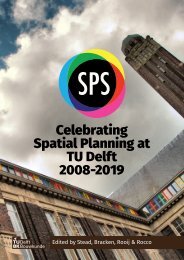*Celebrating Spatial Planning at TU Delft: 2008-2019. Edited by Stead, Bracken, Rooij & Rocco
This is a summary of the achievements of the session Spatial Planning & Strategy of the Department of Urbanism, Faculty of Architecture and the Built Environment, TU Delft, led by Professor Vincent Nadin between 2008 and 2019.
This is a summary of the achievements of the session Spatial Planning & Strategy of the Department of Urbanism, Faculty of Architecture and the Built Environment, TU Delft, led by Professor Vincent Nadin between 2008 and 2019.
Create successful ePaper yourself
Turn your PDF publications into a flip-book with our unique Google optimized e-Paper software.
Urbanism . <strong>TU</strong> <strong>Delft</strong> 79<br />
AMS MADE<br />
Metropolitan Innov<strong>at</strong>ors<br />
ROBERTO ROCCO<br />
The Metropolitan Analysis,<br />
Design & Engineering (MADE)<br />
Master track <strong>at</strong> AMS Amsterdam<br />
Metropolitan Solutions Institute<br />
is a course developed <strong>by</strong> <strong>TU</strong><br />
<strong>Delft</strong> and Wageningen University,<br />
in which SPS has a decisive presence.<br />
Contemporary metropolitan<br />
regions face a variety of complex<br />
challenges th<strong>at</strong> concern large<br />
numbers of stakeholders with,<br />
often competing, claims origin<strong>at</strong>ing<br />
from different world views. One<br />
of the major challenges faced <strong>by</strong><br />
advanced metropolitan regions like<br />
the AMA (Amsterdam Metropolitan<br />
Area) is how to manage transitions<br />
towards sustainability. This transition<br />
is characterised <strong>by</strong> a systems<br />
change, which means th<strong>at</strong> whole<br />
chains of production, consumption,<br />
and behaviour must change over a<br />
long period of time, thus involving a<br />
large number of stakeholders with<br />
multiple worldviews and competing<br />
claims over those systems.<br />
This course enables Metropolitan<br />
Innov<strong>at</strong>ors to identify and evalu<strong>at</strong>e<br />
these claims from three main<br />
perspectives: socio-technical,<br />
ecosystems, and sp<strong>at</strong>ial justice. This<br />
course complements and supports<br />
the Metropolitan Challenges Course,<br />
which is given in the first quarter<br />
of the programme, and provides<br />
a solid ground for the Metropolitan<br />
Solutions Course given l<strong>at</strong>er. It<br />
introduces and discusses tools and<br />
theoretical frameworks for unravelling<br />
complex metropolitan challenges<br />
and presents approaches from<br />
different areas of knowledge dealing<br />
with metropolitan innov<strong>at</strong>ion challenges.<br />
The management of systems’ transition<br />
to sustainability have several<br />
dimensions: cultural, political,<br />
technical, and aesthetic, to cite but<br />
a few. This is because, according to<br />
Henning Larsen, we assume sustainability<br />
can only happen when<br />
its three crucial dimensions (social,<br />
economic, and environmental)<br />
happen simultaneously. Hence, this<br />
transition cannot be addressed <strong>by</strong><br />
planners, engineers, and designers<br />
alone, as they require engagement<br />
with a multiplicity of actors holding<br />
the different perspectives necessary<br />
to understand and tackle all<br />
the dimensions involved.<br />
The various disciplines th<strong>at</strong> contribute<br />
to AMS bring particular<br />
approaches to innov<strong>at</strong>ions towards<br />
sustainability: from engineering<br />
to entrepreneurship, from urban<br />
design to human geography, from<br />
environmental sciences to sociology<br />
of innov<strong>at</strong>ion. Combining these into<br />
interdisciplinary and transdisciplinary<br />
ways of working is required<br />
if we are to be able to deal with<br />
urban development and innov<strong>at</strong>ion.<br />
For any actor who wishes to contribute<br />
to advanced metropolitan<br />
solutions working towards sustainability,<br />
it becomes crucial to be able<br />
to transl<strong>at</strong>e metropolitan challenges<br />
into researchable questions, and<br />
to be able to understand, communic<strong>at</strong>e,<br />
and to cooper<strong>at</strong>e with other<br />
actors in order to integr<strong>at</strong>e their<br />
knowledge about issues <strong>at</strong> hand,<br />
and to understand different (and<br />
often conflicting) objectives.<br />
Awareness of the socio-economic<br />
context, as well as the implicit and<br />
explicit values and cultural norms<br />
oper<strong>at</strong>ing in a specific place, are essential<br />
to achieve suitable solutions.<br />
This course enables students to<br />
use, contrast, discuss, and integr<strong>at</strong>e<br />
those various approaches so th<strong>at</strong><br />
they can engage with metropolitan<br />
innov<strong>at</strong>ions and potential solutions<br />
in a meaningful way, and they do<br />
this <strong>by</strong> using three main perspectives:<br />
socio-technical, ecosystems,<br />
and sp<strong>at</strong>ial justice.<br />
Fig. 45: Students of the MADE course Metropolitan Innov<strong>at</strong>ors explore the Bijlmer, Amsterdam. Photo <strong>by</strong> R. <strong>Rocco</strong>.




